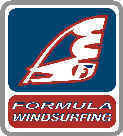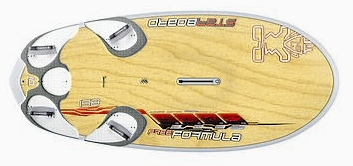|

Pranchas 2004
|
|
|
Starboard
158
Fotos
I was never a
fan of the previous models of the freeformula. I
felt they were not free enough (the carves were
better at that) nor were they formula enough. That
positioning was further affected by the GO boards
which were & still are very fine first time to
intermediate boards.

In my mind
there was clearly a need for a formula like board
which was easier to handle and more oriented
towards reaching and turning. For a long while the
Bic FW1.3 was probably the only one that filled
this niche. Although a lethal race machine in its
own right in either stronger winds or for lighter
sailors, it had a smoothness to its reaching and
gybing that made it a fun and easy board to sail
Somewhere
along the way the lessons of the Starboard Formula
147 made their impact and the freeformula went
through a total transformation. Other than the
name it has nothing in common with the old and in
my opinionated mind uninteresting freeformulas.
The new freeformula clearly owes its genesis to
the lessons of the 147. Short nose, less swing
weight, refined rocker, flat deck, outline well
suited to a very broad range of conditions. What's
been added is soft rails, refined cutaways and an
underwater hull well suited to early planing and
reaching. The rails are truly a work of art,
bevels up front fading into smooth rounded rails
with a hint of tuck.
The hull is
very new to us, we've delivered them and have had
feedback so what follows is very early impressions.
There is a ton of further tuning and testing to
do, as usual, the longer one spends on a board the
more performance can be squeezed out of it.
aesthetics
The first
pictures we saw of the board elicited varying
reactions, but once it appeared in the flesh the
verdict was unanimous. This is a good looking
board. The proportions don't look odd in real life.
The wood model is stunning with its big expanse of
grain. A tiny touch of genius that highlights the
shape is the gray trim around the edges of the
footpads, this hallmark of the 2004 designs really
brings out the grace of this unusual outline.
ergonomics
The 158 is
very short at 231cm. This length is packed into a
board with a maximum width of one meter and a tail
width of 73.5cm, so there is no lack of space for
dancing around on the board. The deck is also nice
and flat. The deck pads are beautifully done,
especially the rear pads. They extend along the
rail making it easy for for those situations where
the rear foot can't quite get into the back straps.
performance
I haven't
spent enough time on the board to truly gauge its
speed, but what little I have done indicates its
quick. The soft rails and rounded rear outline
clearly sacrifice some upwind ability, but give a
huge gain in gybing and tacking. I have an odd
test I do, when slogging, I will try to turn a
board in a tack quickly. This gives a good feel
for how easily the rails slide around.Boards with
easy turning rails and rocker slide around quickly
and boards with hard rails have a perceptible
resistance when doing this. The FF158 does this
with aplomb, not a surprise since no board this
size has such forgiving rails.
One of our
first customers, Mark, raves about its gybing.
He's come to the FF158 via a GO and his two
comments are "its quick" and "it
turns!". Mark is a fit athletic 95kg (I think)
and the volume is more than adequate for his big
frame. Using it in slogging mode, I noticed the
even volume distribution seems to make it sit
level in the water very easily. Its a true fun
board to sail, the soft rails and rocker make for
a big board that can be slammed into turns like no
formula board can.
What about
upwind ability? Its more than adequate. For bigger
sailors or those looking for more performance,
replacing the stock 64 with a good quality 66, 68
or 70 will hugely enhance the board's upwind
ability, of course at the expense of some
maneuverability
Early planing
is good, but I would like to test it with a
broader range of fins to really comment on its
ideal set up for the light days. No reason yet to
doubt that it can get going in the light stuff.
tuning
factors
The footstrap
settings play a huge role in how this board feels.
Move them inboard and you end up in a relaxed easy
sailing, cruising mode. Move them out and back and
you have a speed machine.
At some point I hope to run my quiver of C3,
Deboichet and Select fins to see what the hull can
do whan mated with the very best in fins.
conclusions
In my opinion
this is the most important board in Starboard's
2004 range. Sure, the Sonic 110 is fast, the EVO
is exciting and a genuine breakthrough and the
Formula 158 is going to scare its competitors
silly; but none will have the range and
versatility the FF158 and FF138 will bring to real
world sailors. For big guys, the FF158 will carry
anything from 7.5 to 12.5 (my initial sailing on
it was done with an 11). Something like a GTX 9.8
or 10.5 will bring out the best in this hull for
the bigger guys. For lighter sailors or those
looking for a wide board with a tad more high wind
control, the freeformula 138 will fit the bill.
The Asian
windsurfing tour slalom races sometime get held in
very light air, and I might just be racing on a
Freeformula 158 & GTX for the light days, and
a nitro 7.6 with a Sonic or Hyper for the strong
days. The gybing ability alone will make it lethal
in very light air reaching races compared to
traditional formula hulls.
Make no
mistake, this hull is Starboard's true
breakthrough for 2004. It brings a very accessible
level of performance to light air sailing that no
other board on the market currently does. Finally
a light air hull that is truly fun to sail yet
offers very high levels of performance. Much more
testing and tuning to do, so keep checking back
here or on our forum for updates. We are offering
a GTX/Freeformula package,email us at info@bluefinz.com
for more details.
Fonte : www.bluefinz.com
|

